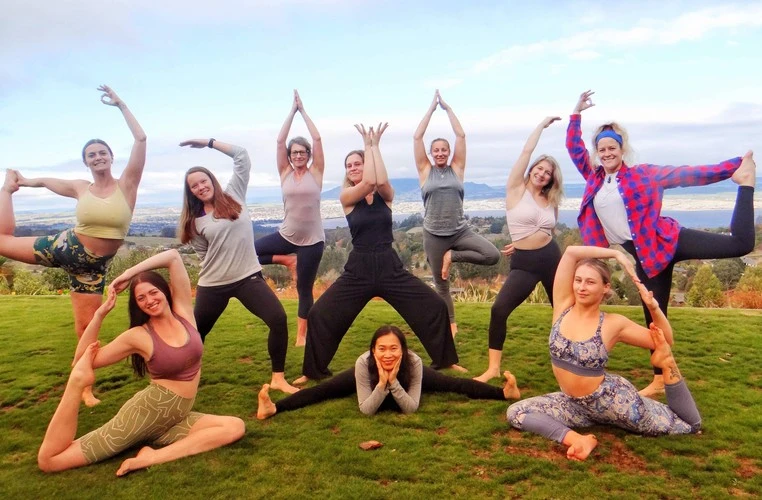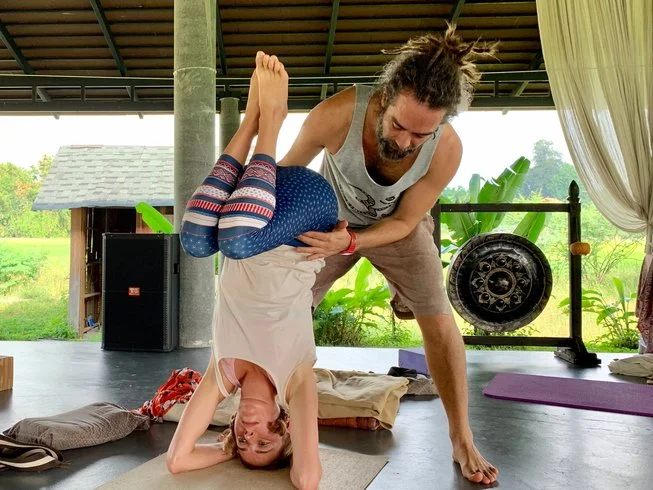Are you ready to embark on a life-changing journey through yoga teacher training in Thailand? Thailand has emerged as a global hub for yoga enthusiasts seeking authentic training in a serene and spiritual setting. With its lush tropical landscapes, tranquil beaches, and rich cultural heritage, Thailand offers the perfect backdrop for immersing yourself in the ancient practice of yoga.
Yoga teacher training in Thailand is not just about mastering yoga poses; it’s a holistic experience that encompasses physical, mental, and spiritual growth. Whether you’re a seasoned practitioner or a beginner, Thailand’s renowned yoga schools cater to practitioners of all levels, providing comprehensive training that aligns with international standards.
One of the key highlights of yoga teacher training in Thailand is the opportunity to study under experienced and knowledgeable instructors who have dedicated their lives to the practice and teaching of yoga. These instructors bring a wealth of wisdom and expertise to the training, guiding students through various yoga disciplines, including Hatha, Vinyasa, Ashtanga, and more.
Contents
Why Choose Yoga Teacher Training in Thailand

Serene and Spiritual Environment: Thailand is filled with beautiful nature and peaceful surroundings that create the perfect atmosphere for practicing yoga. Whether it’s the lush jungles, calm beaches, or quiet mountainsides, Thailand has a variety of peaceful places where you can meditate and focus on your yoga journey.
Experienced Instructors: In Thailand, many experienced and knowledgeable yoga teachers are ready to guide you on your yoga journey. They come from different parts of the world and bring with them a wealth of expertise and teaching styles to help you learn and grow.
Variety of Yoga Styles: No matter what type of yoga you’re interested in, Thailand has it all. From energetic Vinyasa to precise Iyengar, spiritual Hatha, or calming Yin yoga, you can explore and deepen your practice in a variety of yoga styles. Yoga teacher training programs in Thailand cover different yoga disciplines, so you can learn and improve your skills.
Holistic Approach to Training: The best yoga teacher training in Thailand Thailand focuses on more than just physical poses. It includes everything from breathing exercises, meditation, and yoga philosophy to understanding the body’s anatomy and how to teach effectively. This well-rounded training prepares you to be a confident and knowledgeable yoga teacher.
Cultural Immersion: Beyond yoga, Thailand offers a rich cultural experience. You can visit ancient temples, take part in traditional rituals, try delicious Thai food, and immerse yourself in local customs. Yoga teacher training in Thailand gives you the chance to explore Thai culture while growing personally.
Supportive Community: When you join a yoga teacher training program in Thailand, you become part of a supportive community. You’ll meet fellow trainees who are on the same journey as you, and together you’ll support each other through challenges and growth. The bonds you form can last long after the training ends.
International Recognition and Certification: After completing your best yoga teacher training in Thailand, you’ll receive a certification that’s recognized worldwide. This certification, combined with Thailand’s reputation for quality yoga education, opens doors to teaching opportunities around the globe.
Curriculum Overview of Yoga Teacher Training in Thailand:

- Introduction to Yoga Philosophy and History:
- Exploration of the origins and philosophy of yoga, including its historical development and key philosophical concepts.
- Study of ancient yogic texts such as the Yoga Sutras, Bhagavad Gita, and Hatha Yoga Pradipika.
- Yoga Asanas (Postures) and Alignment:
- Comprehensive instruction on the proper alignment and execution of yoga postures (asanas) to ensure safety and effectiveness.
- Practice and refinement of a wide range of asanas, including standing poses, forward bends, backbends, twists, and inversions.
- Pranayama (Breathwork) and Meditation Techniques:
- Exploration of various pranayama techniques to regulate and control the breath for enhanced energy, relaxation, and mental focus.
- Introduction to meditation practices, including mindfulness meditation, concentration techniques, and guided visualization.
- Anatomy and Physiology:
- Understanding the anatomy and biomechanics of the human body relevant to yoga practice, including the muscular-skeletal system, respiratory system, and nervous system.
- Application of anatomical knowledge to optimize alignment, prevent injuries, and enhance the therapeutic benefits of yoga.
- Yoga Philosophy and Ethics:
- Delving deeper into yogic philosophy, including concepts of karma, dharma, and the eight limbs of yoga as outlined in Patanjali’s Yoga Sutras.
- Discussion of ethical guidelines and principles for yoga teachers, including professional conduct, student-teacher relationships, and respect for diversity.
- Teaching Methodology and Practicum:
- Instruction on effective teaching techniques, including class sequencing, cueing, demonstration, and hands-on adjustments.
- Practice teaching sessions where students lead yoga classes under the guidance and feedback of experienced instructors.
- Business and Marketing Skills for Yoga Teachers:
- Guidance on building a successful career as a yoga teacher, including business management, marketing strategies, and creating a sustainable yoga teaching practice.
- Exploration of opportunities for teaching yoga in various settings, including studios, gyms, retreat centers, corporate settings, and private sessions.
- Specialized Workshops and Electives:
- Optional workshops and elective classes cover specialized topics such as prenatal yoga, restorative yoga, yoga for athletes, yoga therapy, Ayurveda, and more.
- Opportunities for students to explore specific areas of interest and deepen their knowledge and skills in specialized areas of yoga practice.
- Self-Reflection and Personal Development:
- Integrating self-reflection practices, journaling, and group discussions to deepen self-awareness, personal growth, and transformation throughout the training journey.
- Encouragement of self-care practices and holistic well-being to support students in maintaining balance and sustainability in their personal and professional lives.
- Final Assessments and Certification:
- Evaluation of students’ knowledge, skills, and teaching abilities through written exams, practical assessments, and teaching demonstrations.
- Awarding of internationally recognized certification upon successful completion of all curriculum requirements, enabling graduates to register as certified yoga teachers with Yoga Alliance or other recognized yoga organizations.
Check Out More Blog:- Yoga Teacher Training in Bali
Post-Training Opportunities of Yoga Teacher Training in Thailand:

- Teaching Yoga Globally:
- Graduates of yoga teacher training in Thailand have the opportunity to teach yoga internationally.
- Certification from a reputable yoga school in Thailand is recognized worldwide, enabling graduates to pursue teaching opportunities in various countries.
- Yoga Studios and Retreat Centers:
- Many graduates choose to teach at yoga studios or retreat centers both in Thailand and abroad.
- Thailand’s thriving yoga scene and abundance of retreat centers provide ample opportunities for employment or collaboration.
- Wellness Resorts and Spas:
- Graduates with specialized training in areas such as yoga therapy or wellness coaching may find opportunities to work in luxury resorts and spas offering yoga and wellness programs.
- Private Instruction and Corporate Yoga:
- Some graduates opt to offer private yoga sessions to individuals or small groups.
- Others may provide corporate yoga classes for businesses looking to offer wellness programs to their employees.
- Online Teaching and Workshops:
- With the rise of online platforms, many graduates choose to teach yoga remotely through virtual classes or workshops.
- Online teaching allows for flexibility and the ability to reach students worldwide.
- Yoga Teacher Training Programs:
- Experienced graduates may choose to become yoga teacher trainers themselves, leading their own teacher training programs in Thailand or other locations.
- Community Outreach and Non-Profit Organizations:
- Graduates passionate about community service may volunteer or work with non-profit organizations that offer yoga programs to underserved communities.
- Continuing Education and Specialized Training:
- Graduates interested in furthering their education may pursue advanced yoga teacher training programs or specialized certifications in areas such as prenatal yoga, trauma-informed yoga, or yoga therapy.
- Holistic Wellness Centers and Integrative Health Facilities:
- Graduates with a holistic approach to wellness may find opportunities to work in integrative health facilities or wellness centers offering a range of holistic services.
- Writing and Publishing:
- Graduates with a passion for writing may explore opportunities to contribute articles or books related to yoga, wellness, or personal development.
- Publishing articles or books can establish credibility and provide additional income streams for yoga teachers.
Top 10 Yoga Teacher Training Institutes in Thailand

-
Absolute Sanctuary
- Location: Koh Samui
- Special Course: “Luxury Yoga Teacher Training Retreat”
-
Samahita Retreat
- Location: Koh Samui
- Special Course: “Yoga Teacher Training Immersion”
-
Yoga Vidya Mandiram
- Location: Chiang Mai
- Special Course: “Traditional Hatha Yoga Teacher Training”
-
Vikasa Yoga Retreat
- Location: Koh Samui
- Special Course: “Transformational Yoga Teacher Training”
-
Yoga Tree
- Location: Chiang Mai
- Special Course: “Intensive Vinyasa Yoga Teacher Training”
-
Samma Karuna
- Location: Koh Phangan
- Special Course: “Yoga Alliance 200-Hour Yoga Teacher Training”
-
Suryamuni Healing Center
- Location: Koh Phangan
- Special Course: “Yin Yoga Teacher Training and Reiki Certification”
-
Pure Flow Yoga
- Location: Koh Phangan
- Special Course: “Soulful Vinyasa Yoga Teacher Training”
-
Yoga Republic
- Location: Koh Samui
- Special Course: “Ashtanga Yoga Teacher Training Intensive”
-
Blooming Lotus Yoga
- Location: Koh Phangan
- Special Course: “300-Hour Advanced Yoga Teacher Training”
Conclusion:-
In conclusion, undertaking Yoga Teacher Training in Thailand offers a transformative and enriching experience that goes beyond mere certification. Thailand’s serene natural landscapes, coupled with its rich spiritual heritage and expert instruction, provide an ideal environment for deepening one’s practice and understanding of yoga. Through rigorous training, immersive learning, and cultural immersion, participants not only develop the skills to teach yoga effectively but also embark on a personal journey of self-discovery and growth. The holistic approach to yoga education in Thailand fosters not only physical strength and flexibility but also mental clarity, emotional balance, and spiritual insight. Whether one seeks to become a certified yoga instructor or simply deepen their practice, the Yoga Teacher Training in Thailand offers a profound opportunity for personal and professional development in a setting that nurtures body, mind, and soul.
